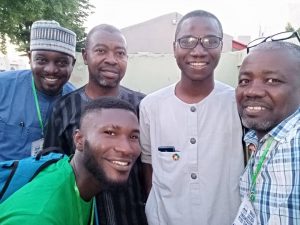- Attacks believers in Fulanisation
Columnist and social theorist, Prof Jibrin Ibrahim of Nigeria says the social media is the fifth force destroying democracy in Africa, the other four being the demise of opposition parties, the collapse of trade and professional unions, the evaporation of the student movement and the weakening of the media.

Some members of the influencers shortly after close of the conference Wednesday evening
In the third Plenary Lecture that closed the July 30th and 31st, 2019 Kano Social Influencers Summit Wednesday, Prof Ibrahim credited the Algorithmic configuration of information in the world today by the social media with producing the situation he says makes it possible for even professors to believe the Fulanisation narrative in Nigeria, for instance, saying there was something stupid in believing in such a narrative.
In the days when Nigeria was its vibrant self, his intervention would have been the subject of a huge but highly intellectualised debate. Things have largely fallen apart especially in Nigeria and more heat rather than light is likely to be generated in response to the controversial argument. The first puzzle in Prof Ibrahim’s position is how a social theorist of a liberal persuasion would arrive at the same position advanced by surveillance theory for whom the social media is a technology of panoptic power. That is power based on conditioning the citizen to behave him or herself out of awareness of being observed by an all-seeing state that s/he cannot counter-observe.
Explaining how the social media is destroying democracy, Prof Ibrahim more popularly known as Jibo told his listeners this is a very complicated process which renders the highly democratic promise of the social media a nullity arising from what he calls massive concentration and centralization of information based on surveillance. As such, the information that the social media provides is not the authentic sentiments of citizens upon which elected leaders can base their leadership or service to community. Rather, information provided by the social media are filtered, manipulated and false. They are so because they are based on what can sell as deduced from details of personal preferences of individual users – what appeals to the emotion of the average user, his or her emotions, anger triggers, sensation and the likes. The implication is that instead of media messages as what have been filtered by professional journalists, the social media serves what is exciting to the average reader’s emotion as to make the charlatan the hero all over the world today.
Citing names to buttress his argument, Jibo says that is how the social media has emerged the fifth force for the destruction of democracy in the African context. Although democracy in Africa, he said, had been facing decline, what with the reversal of the gains of the struggle for and winning of independence in the 1960s with the return of authoritarianism especially between 1994 and 2004. He is, however, of the view that the social media has been accelerating the decline because all the millions of Nigerians on Facebook and twitter and so on are vulnerable to being given back what technology discovered to be their base news needs. The result is a world in which the distinction between truth and untruth has disappeared and in which what those who are powerful can define the truth of those who are powerless as untrue. Those promoting the post-truth world, said Jibo, have studied the history of the use of Fake News by Hitler and seen a tactic that worked and are replicating it. Quoting Hannah Arendt, the social philosopher of how society gets rendered bereft of the comprehension of complex processes and its replacement with reductionism, Jibo posited such to be the only plausible explanation for anybody believing that Fulanis in Nigeria are out on an agenda of conquest and Islamisation.
Comparing that to the successful framing of Jews as being the bogeymen out to undermine Western civilisation, he argues it fits into a programme of simplifying complex issues to “the foreign evil person as the sole explanation of crisis”. Continuing, he insisted that something must be happening to critical thinking for anybody to believe the Fulanisation narrative, citing how ridiculous it would be for the Fulani who are less than 1% of the population in Nigeria to successfully wipe out the Tiv nationality, for example. Yet, according to him, that was the sort of narrative he was presented by the Benue State governor in 2018 when he formed part of a Nigerian Bar Association, (NBA) intervention team to the state.
Grazing reserves, he said, developed out of a 1964 study which produced the analysis that well fed cattle that cannot move about needed to be taken care that way. That is what is being interpreted deliberately in accordance with a post-truth world as a Fulani land grab plot, said Jibo. Although he blamed the government for discursive insensitivity in calling it cattle colony, Jibo still pointed out how the document the Benue State governor presented was no more than a piece of internet propaganda represented in other fora by other nationalities in the Middle Belt.
 But he warns against being misunderstood to be saying that the social media has no redeeming features, saying that its contribution to the Arab Springs could not escape mention. That, he said, did not make media content the most important element. In fact, his argument is that “it is very important to understand the true nature of the social media” which, for him, is the first way of moving forward.
But he warns against being misunderstood to be saying that the social media has no redeeming features, saying that its contribution to the Arab Springs could not escape mention. That, he said, did not make media content the most important element. In fact, his argument is that “it is very important to understand the true nature of the social media” which, for him, is the first way of moving forward.
Interestingly, Prof Ibrahim’s Plenary Lecture followed a skype intervention by Adaora Ikenze, Facebook’s Head of Public Policy for West and Central Africa. One of the points she stressed in the presentation is how Facebook demotes any posting it discovers to be out of sync. Prof Jibo seized on that to wonder why they don’t remove such stories but merely demote them. His answer is that the profit motif disallows them from doing so as all such stories on Facebook are products of detailed filtering of the individual.
From head to toe, Jibo’s intervention is the most provocative but most likely to be controversial and contested narrative in recent times. And this would be on several grounds. Already, the theory ground has been mentioned. But beyond that, his analysis is an attack on the Marxist theory of the state that it is an instrument of class domination as much as it attacks protagonists of Fulanisation. All those who subscribes to these doctrines and concepts are bound to reply him. As far as this analysis goes, it places Jibo among those who talk of the state as a contested space between the territorial and capitalist logic of power as opposed to the homogenizing and friction-free narrative of the state as something the ruling class controls. Protagonists of Fulanisation are likely to hit back by pointing out ‘silences’ in Jibo’s analysis by saying that what people believe in is what matters, not evidence and that Fulanisation is a case of what people believe in and only a problem because the Buhari administration is so incompetent in the politics of managing meaning. Developmental statists are likely to wonder why any modernist such as Jibo might want to excuse or rationalize open grazing whether there is protest against it or not. It is simply backward is most likely to be the counter-argument.
While these likely scenarios are at the domestic level, what Facebook might say is unpredictable. It is true scholars and theorists of surveillance have published claims of social media platforms being products of intelligence or technologies of control through panoptic power, such is not everyday stuff from Africa to the gamut called the social media.




























